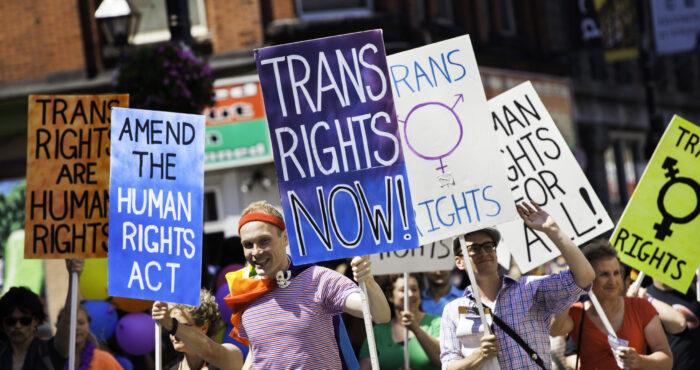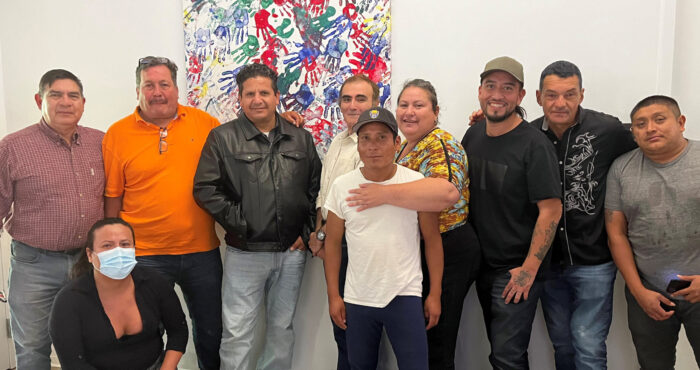Trans health justice, person-centered care, and harm reduction form the basis of a new program for the transgender, gender non-conforming, and intersex (TGNCI) folks in our community. Services are currently offered at our sexual health clinic Magnet at Strut in the Castro, through a secondary exchange program through our Syringe Access Services program, and will eventually expand to all three San Francisco AIDS Foundation sites plus our mobile clinic.
“The ultimate goal of the program is to become a one-stop shop where TGNCI people can access gender-affirming sexual health services, substance use counseling, gender-transition care, and more,” said Joaquin Meza, the coordinator for TransCare. “We start by intentionally asking, ‘What do you need, and how can we support?’ Together, we develop a plan in line with the client’s goals–whether it’s an HIV test, treatment or prevention, STI testing or treatment, injection supplies for gender affirming hormones or IV drug injection, mental health support, benefit navigation–the list goes on.”
Ensuring trans health equity comes first and foremost.
“The U.S has had a record number of anti-transgender bills filed for the 2021 state legislative session in the first quarter alone,” said Marion Pellegrini, clinical manager. “Some of these bills are anti-transgender medical care bans, and some are religious exceptions for medical providers and institutions which could be used to justify denial of care to a transgender person.”
Anti-transgender legislation, bias within the medical field, and lack of health care provider awareness and education can make gender-affirming services difficult for the TGNCI community to find and access.
“With San Francisco’s reputation as a haven for trans folks, especially with the recent visibility of the Transgender District, many people come to the Bay Area seeking safety, community, and access to care. But even here in San Francisco, where we have more options for gender-affirming care, we still have our challenges. It can be difficult to know where to look and how to navigate the system, and too many providers are still learning how to best care for their trans patients, which is frustrating,” said Pellegrini.
This is why the goal of the SFAF program is to provide easy-to-access, culturally competent services free of charge to the community.
“We prioritize trans sex workers, people who use drugs, people who are undocumented or lack insurance, and those who face anti-Black racial discrimination. Our main goal is to provide the TGNCI community with the opportunity and resources to make healthy decisions,” said Meza.
Janessa Broussard, RN, MSN, AGNP-C, the vice president of medical affairs, said the trans-led program has been informed by the expertise in the trans community, and is prioritizing services that TGNCI individuals want and need the most. The program will provide trans primary care services, but also the gender-affirming care services that are oftentimes overlooked by health care providers who don’t specialize in trans healthcare.
In addition to all of the sexual health and HIV care services provided by Magnet, TransCare clients can access gender-affirming hormones (and injection assistance), substance use support, harm reduction and overdose prevention, and more. In the future, the team plans to offer services including support in accessing gender-affirming surgeries, post-op care, and laser hair removal.
Trans and non-binary individuals in our community who use injection drugs will have a new opportunity to get involved in sharing harm reduction supplies and information with others in the community through a new program with Syringe Access Services. People who participate will bring safer injection and smoking supplies and overdose prevention education and Narcan to people in their networks, in places where they live, or to other places they go in the community.
“With the Syringe Access Services Trans and Non-Binary Community Secondary Syringe Exchange Program, community members will be paid to utilize their skills and knowledge as trusted leaders to provide harm reduction education and get needed harm reduction supplies out to folx their community,” said Ro Giuliano, director of Syringe Access Services.
“It’s no secret that transgender (and non-binary) individuals face specific barriers in terms of receiving services, including harm reduction services,” said Seth Katz, a health educator with Syringe Access Services. “Which is one of so many reasons we need programs and services specifically for our community. These services can be transition-specific including the legalities of name and gender change, access to hormones and other medical needs, or social programs that connect us to other community members. Our newest community secondary syringe exchange program (CSSEP) centers transgender and non-binary community exchangers. Having community is sacred, and we aim to empower our community members in our journey to minimize the barriers trans and non-binary participants face.”
“We lost connection to many of our communities due to the closing of our lounge space [at the 6th Street Harm Reduction Center] due to COVID-19,” said Ashley Fairburn, a community secondary syringe exchange coordinator with Syringe Access Services. “This is an opportunity for us to rebuild these connections and offer services to folx in new and different ways that meet the needs of people who use drugs.”
In commemoration of International Trans Day of Visibility, the team has collaborated with the San Francisco Department of Public Health to open up COVID-19 vaccine appointments at Strut for eligible members of the TGNCI community. (Appointments are required and dozens have applied to be enrolled.)
“Our outreach focuses on Black, Latinx, AAPI, Ingenious, disabled TGNCI folks who wouldn’t feel comfortable or safe going to a mass vaccination site such as Moscone, or who wouldn’t qualify for a vaccine there without proper documentation,” said Meza. “We’ll be reaching folks who may be experiencing homelessness, who live in congregate housing settings, who are living with HIV, engage in survival sex work or who otherwise may be at high risk for COVID-19 due to already existing racial and transgender health disparities. We’ve been really fortunate to work in collaboration with many trans-led community organization partners to expand testing and get the word out to members of the TGNCI community.”










